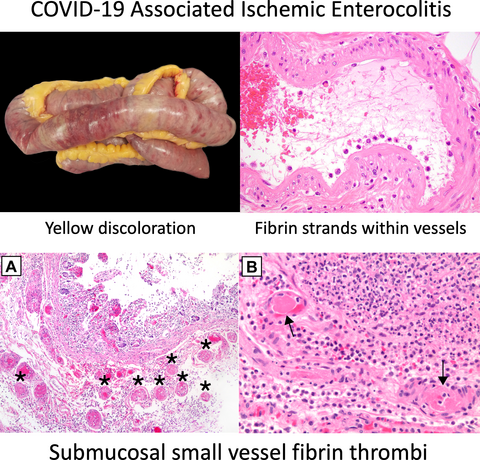Clinicopathological findings in patients with COVID-19-associated ischaemic enterocolitis
Abstract
Aims
Coronavirus disease 2019 (COVID-19) has been recognised as a predominantly respiratory tract infection, but some patients manifest severe systemic symptoms/coagulation abnormalities. The aim of this study was to evaluate the impact of severe COVID-19 infection on the gastrointestinal tract.
Methods and results
We examined clinicopathological findings in 28 resected ischaemic bowels from 22 patients with severe COVID-19. Most patients required intubation preoperatively and presented with acute decompensation shortly before surgery. D-dimer levels were markedly elevated in all measured cases (mean, 5394 ng/ml). Histologically, 25 cases (19 patients) showed evidence of acute ischaemia with necrosis. In this group, the most characteristic finding was the presence of small vessel fibrin thrombi (24 of 25 cases, 96%), which were numerous in 64% of cases. Patients with COVID-19 were significantly more likely than a control cohort of 35 non-COVID-19-associated acute ischaemic bowels to show isolated small intestine involvement (32% versus 6%, P < 0.001), small vessel fibrin thrombi (100% versus 43%, P < 0.001), submucosal vessels with fibrinous degeneration and perivascular neutrophils (90% versus 54%, P < 0.001), fibrin strands within submucosal vessels (58% versus 20%, P = 0.007), and histological evidence of pneumatosis (74% versus 34%, P = 0.010). Three cases in this cohort had histopathological findings normally seen in the setting of chronic ischaemia, notably prominent fibroblastic proliferation affecting the outer layer of the muscularis propria.
Conclusions
Herein, we describe the histopathological findings in COVID-19-associated ischaemic bowels and postulate a relationship with the hypercoagulable state seen in patients with severe COVID-19 infection. Additional experience with these cases may further elucidate specific features or mechanisms of COVID-19-associated ischaemic enterocolitis.
Graphical Abstract
Conflicts of interest
The authors state that they have no conflicts of interest.





